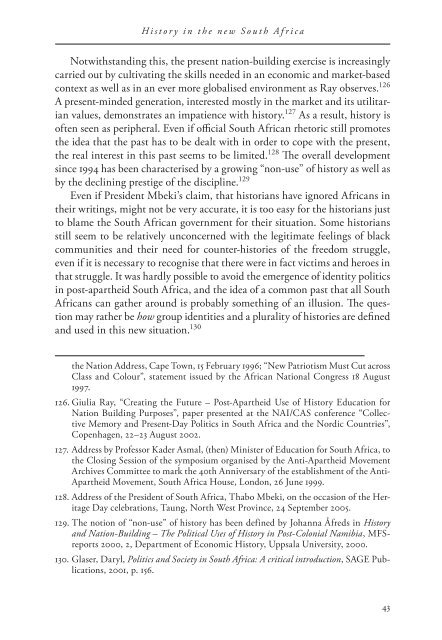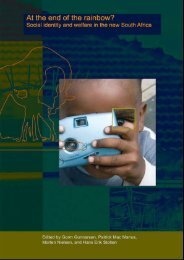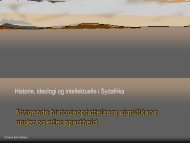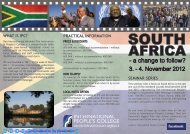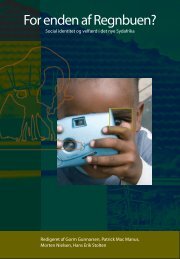History Making and Present Day Politics - Stolten's African Studies ...
History Making and Present Day Politics - Stolten's African Studies ...
History Making and Present Day Politics - Stolten's African Studies ...
Create successful ePaper yourself
Turn your PDF publications into a flip-book with our unique Google optimized e-Paper software.
H i s t o r y i n t h e n e w S o u t h A f r i c a<br />
Notwithst<strong>and</strong>ing this, the present nation-building exercise is increasingly<br />
carried out by cultivating the skills needed in an economic <strong>and</strong> market-based<br />
context as well as in an ever more globalised environment as Ray observes. 126<br />
A present-minded generation, interested mostly in the market <strong>and</strong> its utilitarian<br />
values, demonstrates an impatience with history. 127 As a result, history is<br />
often seen as peripheral. Even if official South <strong>African</strong> rhetoric still promotes<br />
the idea that the past has to be dealt with in order to cope with the present,<br />
the real interest in this past seems to be limited. 128 The overall development<br />
since 1994 has been characterised by a growing “non-use” of history as well as<br />
by the declining prestige of the discipline. 129<br />
Even if President Mbeki’s claim, that historians have ignored <strong>African</strong>s in<br />
their writings, might not be very accurate, it is too easy for the historians just<br />
to blame the South <strong>African</strong> government for their situation. Some historians<br />
still seem to be relatively unconcerned with the legitimate feelings of black<br />
communities <strong>and</strong> their need for counter-histories of the freedom struggle,<br />
even if it is necessary to recognise that there were in fact victims <strong>and</strong> heroes in<br />
that struggle. It was hardly possible to avoid the emergence of identity politics<br />
in post-apartheid South Africa, <strong>and</strong> the idea of a common past that all South<br />
<strong>African</strong>s can gather around is probably something of an illusion. The question<br />
may rather be how group identities <strong>and</strong> a plurality of histories are defined<br />
<strong>and</strong> used in this new situation. 130<br />
the Nation Address, Cape Town, 15 February 1996; “New Patriotism Must Cut across<br />
Class <strong>and</strong> Colour”, statement issued by the <strong>African</strong> National Congress 18 August<br />
1997.<br />
126. Giulia Ray, “Creating the Future – Post-Apartheid Use of <strong>History</strong> Education for<br />
Nation Building Purposes”, paper presented at the NAI/CAS conference “Collective<br />
Memory <strong>and</strong> <strong>Present</strong>-<strong>Day</strong> <strong>Politics</strong> in South Africa <strong>and</strong> the Nordic Countries”,<br />
Copenhagen, 22–23 August 2002.<br />
127. Address by Professor Kader Asmal, (then) Minister of Education for South Africa, to<br />
the Closing Session of the symposium organised by the Anti-Apartheid Movement<br />
Archives Committee to mark the 40th Anniversary of the establishment of the Anti-<br />
Apartheid Movement, South Africa House, London, 26 June 1999.<br />
128. Address of the President of South Africa, Thabo Mbeki, on the occasion of the Heritage<br />
<strong>Day</strong> celebrations, Taung, North West Province, 24 September 2005.<br />
129. The notion of “non-use” of history has been defined by Johanna Åfreds in <strong>History</strong><br />
<strong>and</strong> Nation-Building – The Political Uses of <strong>History</strong> in Post-Colonial Namibia, MFSreports<br />
2000, 2, Department of Economic <strong>History</strong>, Uppsala University, 2000.<br />
130. Glaser, Daryl, <strong>Politics</strong> <strong>and</strong> Society in South Africa: A critical introduction, SAGE Publications,<br />
2001, p. 156.<br />
43


